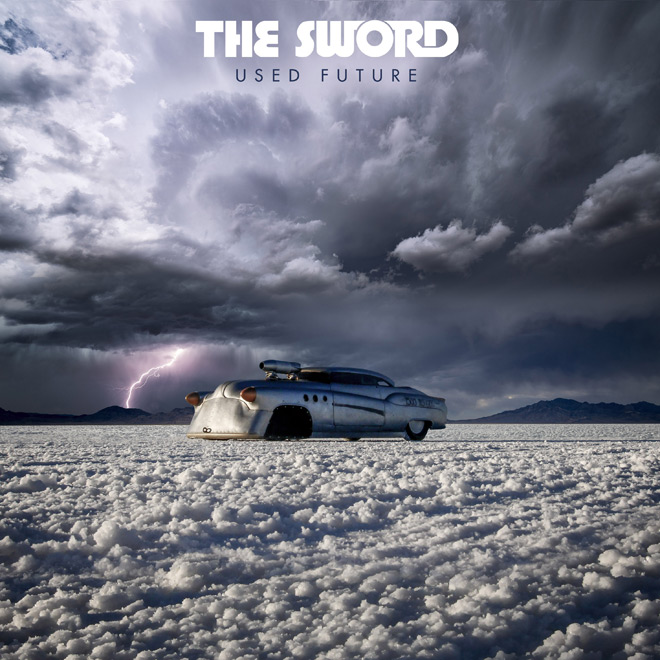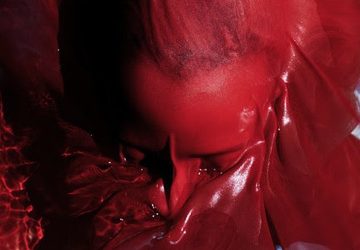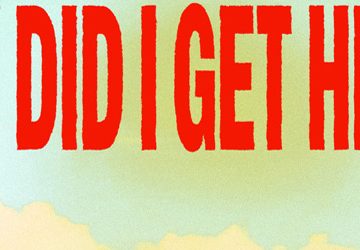
The resulting tour for the last album saw the departure of Wingo, citing exhaustion, and after a brief stay by Touring Drummer Kevin Fender, the band regrouped to record 2012’s Apocryphon, their first release on Razor & Tie, and first with permanent replacement Santiago “Jimmy” Vela III on Drums. The lineup returned for 2015’s High Country and its acoustic brethren, 2016’s Low Country, and more heavy touring resulted in a live album, Greetings From…, a year later.
Now the forceful quartet are back with a sixth album, Used Future, which arrives March 23, 2018, again through Razor & Tie. Used Future was produced by Tucker Martine, who recently worked with My Morning Jacket and the Decemberists, and mastered by Brian Lucey, whose latest collaborations include Ghost and the Black Keys. The usual haunts of Black Sabbath and Led Zeppelin are set aside for the moment here, in favor of sounds more in the vein of 1970s Pink Floyd and Dire Straits, as well as some early Monster Magnet and other fuzz/stoner sounds, always done with the original flair The Sword have used during their career. The usual heavy guitar wall of the band also takes a backseat in favor of synthesizers, with expansive moods tending to be set with “more less” than “more more.”
After “Prelude” takes a quick shot at setting the stage, the album rushes into “Deadly Nightshade,” which is full of the masterful guitar work and tight rhythm section expected from The Sword. Vocals are densely sparse as usual, and the actual lyrics more so, as the rhymes are short but effortless while never sounding cheap or easy. Ebullient bass lines help spread the vibes across the landscape. This track, which was also the first single from the album, is an excellent opener and stands with “Don’t Get Too Comfortable,” “The Wild Sky,” and the title-track as the best tracks.
The guitar riffs within “Twilight Sunrise” approach the realm of Mark Knopfler and Dire Straits. Airy vocals from John Cronise are peppered by guitar riffs that subtly crawl and crush. Later, the title track continues this trip through Dire Straits territory, with tricky guitar melodies spread beneath and around the laconic vocals. The lyrics are short and to the point, which seems to be a much more difficult task than being overly dense and loquacious.
Bass and drums carry “The Wild Sky” into focus, with chippy electric guitar fuzz setting the mood for the first of more than a few instrumental tracks; nearly half the songs on the album appear without any vocals, and a few others have only sparse appearances by Cronise. “Intermezzo” cuts a quick interlude full of bouncy chords and wailing guitar, before “Sea of Green” starts with an almost bubblegum Surf Rock feel, eventually traipsing off into a guitar-laden jaunt that forces the listener to bob and weave with the tempo. The vocals return here but they are minimal and light, with five minutes of guitar wizardry filling the gaps as needed. “Nocturne” sees a quick return to the instrumental stylings; halfway through, a nascent tick-tock soundtrack evokes Pink Floyd without sounding copied or sophomoric.
If the overall lack of vocals begin to wear down the listener, the pipe work by Cronise on “Don’t Get Too Comfortable” makes up for absences elsewhere. Frank, terse statements are delivered with stern warning, and the guitar work backs up his claims. The vocals and lyrics take on an almost Alice in Chains vibe with Cronise playing the part of Layne Staley, squeezing some lyrics and stretching others, fitting his voice into an otherwise cramped vocal space. A slow, lazy melody takes hold within “Come and Gone,” and the dreamy vocals barely register.
If you could manage to capture The Sword within just one track from this album, “Book of Thoth” would be the track that comes the closest to the goal. Airy, spacey vocals laid over driving guitar and powerful drums, breaking lightly for vocals before all sounds descend to loud madness for each run of the chorus. “The Wild Sky” also has some of the heaviest elements on the album. “Brown Mountain” paints another instrumental landscape, lush with guitar and synthesizers, and setting up the listener for a crescendo that serves almost as an encore to the tracks prior. The heaviness is again present here, so older fans should find their fill as needed. A reprise of “Come and Gone” closes the album, encouraging everyone to just sit back, relax, and let the soft melody from “Come and Gone” take you home.
Used Future may not have the deafening bombast of earlier releases, but the sneaky musicianship and vast imagination presented within its baker’s dozen tracks make up for this difference. The album offers a parallel universe where the very same members wondered aloud how to make a loud, forceful album, albeit quietly. Sturdy tracks, expert songwriting, and a thorough thrill-ride earn Used Future by The Sword a loud 4.5 out of 5 stars.







No comment